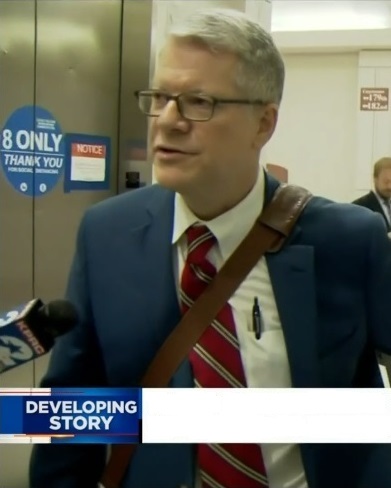 Sec. 481.134. DRUG-FREE ZONES. (a) In this section:
Sec. 481.134. DRUG-FREE ZONES. (a) In this section:
(1) “Minor” means a person who is younger than 18 years of age.
(2) “Institution of higher education” means any public or private technical institute, junior college, senior college or university, medical or dental unit, or other agency of higher education as defined by Section 61.003, Education Code.
(3) “Playground” means any outdoor facility that is not on the premises of a school and that:
(A) is intended for recreation;
(B) is open to the public; and
(C) contains three or more play stations intended for the recreation of children, such as slides, swing sets, and teeterboards.
(4) “Premises” means real property and all buildings and appurtenances pertaining to the real property.
(5) “School” means a private or public elementary or secondary school or a day-care center, as defined by Section 42.002, Human Resources Code.
(6) “Video arcade facility” means any facility that:
(A) is open to the public, including persons who are 17 years of age or younger;
(B) is intended primarily for the use of pinball or video machines; and
(C) contains at least three pinball or video machines.
(7) “Youth center” means any recreational facility or gymnasium that:
(A) is intended primarily for use by persons who are 17 years of age or younger; and
(B) regularly provides athletic, civic, or cultural activities.
(b) An offense otherwise punishable as a state jail felony under Section 481.112, 481.113, 481.114, or 481.120 is punishable as a felony of the third degree, and an offense otherwise punishable as a felony of the second degree under any of those sections is punishable as a felony of the first degree, if it is shown at the punishment phase of the trial of the offense that the offense was committed:
(1) in, on, or within 1,000 feet of premises owned, rented, or leased by an institution of higher learning, the premises of a public or private youth center, or a playground; or
(2) in, on, or within 300 feet of the premises of a public swimming pool or video arcade facility.
(c) The minimum term of confinement or imprisonment for an offense otherwise punishable under Section 481.112(c), (d), (e), or (f), 481.113(c), (d), or (e), 481.114(c), (d), or (e), 481.115(c)-(f), 481.116(c), (d), or (e), 481.117(c), (d), or (e), 481.118(c), (d), or (e), 481.120(b)(4), (5), or (6), or 481.121(b)(4), (5), or (6) is increased by five years and the maximum fine for the offense is doubled if it is shown on the trial of the offense that the offense was committed:
(1) in, on, or within 1,000 feet of the premises of a school, the premises of a public or private youth center, or a playground; or
(2) on a school bus;
(d) An offense otherwise punishable under Section 481.112(b), 481.113(b), 481.114(b), 481.115(b), 481.116(b), 481.120(b)(3), or 481.121(b)(3) is a felony of the third degree if it is shown on the trial of the offense that the offense was committed:
(1) in, on, or within 1,000 feet of any real property that is owned, rented, or leased to a school or school board, the premises of a public or private youth center, or a playground; or
(2) on a school bus.
(e) An offense otherwise punishable under Section 481.117(b), 481.119(a), 481.120(b)(2), or 481.121(b)(2) is a state jail felony if it is shown on the trial of the offense that the offense was committed:
(1) in, on, or within 1,000 feet of any real property that is owned, rented, or leased to a school or school board, the premises of a public or private youth center, or a playground; or
(2) on a school bus.
(f) An offense otherwise punishable under Section 481.118(b), 481.119(b), 481.120(b)(1), or 481.121(b)(1) is a Class A misdemeanor if it is shown on the trial of the offense that the offense was committed:
(1) in, on, or within 1,000 feet of any real property that is owned, rented, or leased to a school or school board, the premises of a public or private youth center, or a playground; or
(2) on a school bus.
(g) Subsection (f) does not apply to an offense if:
(1) the offense was committed inside a private residence; and
(2) no minor was present in the private residence at the time the offense was committed.
(h) Punishment that is increased for a conviction for an offense listed under this section may not run concurrently with punishment for a conviction under any other criminal statute.
Added by Acts 1993, 73rd Leg., ch. 888, Sec. 1, eff. Sept. 1, 1993. Amended by Acts 1995, 74th Leg., ch. 260, Sec. 39, eff. May 30, 1995; Acts 1995, 74th Leg., ch. 318, Sec. 38, eff. Sept. 1, 1995; Acts 1997, 75th Leg., ch. 1063, Sec. 9, eff. Sept. 1, 1997; Acts 2003, 78th Leg., ch. 570, Sec. 3, eff. Sept. 1, 2003.
Amended by:
Acts 2009, 81st Leg., R.S., Ch. 452, Sec. 1, eff. September 1, 2009.
Acts 2009, 81st Leg., R.S., Ch. 452, Sec. 2, eff. September 1, 2009.
____________________
Courtesy, Attorneys Jim Sullivan and Associates, Texas Criminal Defense Lawyers.
Free Initial Consultation. 281-546-6428. Contact us today.
As a Texas Criminal Defense Attorney, Nancy Botts’ main interest is in the areas of search and seizure law and drug defense. Nancy Botts has good results in Texas drug defense cases and in federal drug defense cases. Other Houston criminal lawyers have consulted her for years about these subjects. Nancy Botts aggressively defends all felony and misdemeanor drug possession and drug delivery cases. Nancy Botts has successfully fought possession and delivery of controlled substance cases for amounts ranging from less than one gram to several kilograms.
This is a local copy of a section of the Texas Controlled Substances Act.
